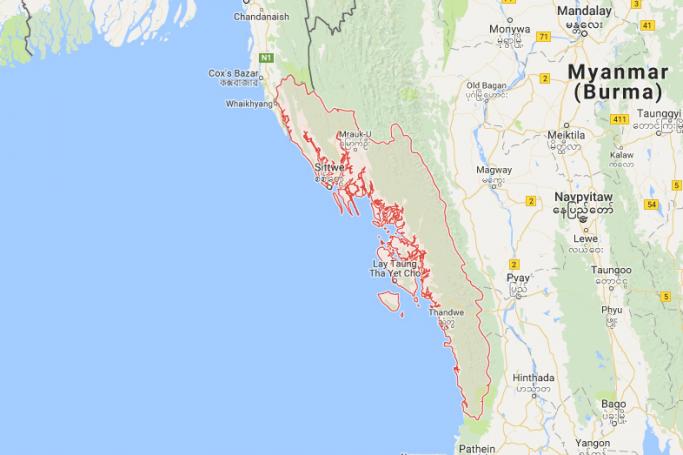Myanmar troops killed 10 people in northern Rakhine on Wednesday, the military said, as the death toll mounted from a spate of violent clashes in a region long-scarred by sectarian unrest.
Dozens of people have died in the area bordering Bangladesh in the past few days, raising the spectre of a repeat of communal violence that ripped the state apart four years ago and drove tens of thousands into displacement camps.
The latest clashes took place in KyetYoePyin village near Maungdaw town, an area home to the persecuted Muslim Rohingya minority that has been under lockdown after a series of attacks on border guards.
"As the military troops followed (a group of men) they started to attack, shooting with guns, using sticks and knives," the military said in a statement. "The attackers retreated to the northwest as the military returned fire."
"Ten dead bodies of violent attackers and a gun were found."
"Terrorists" also attacked a border outpost and set fire to 25 houses in Warpaik village as troops conducted clearance operations in the area, the president's office said in a statement.
Troops have poured into the area around Maungdaw after nine police officers were killed on Sunday in attacks on three border posts which authorities blamed on mobs wielding swords and homemade weapons.
Villagers have fled their homes, while teachers and government workers have flocked to the state capital Sittwe after more than 400 schools were closed and a curfew brought in between 7pm and 6am.
The fresh casualties come after state media reported a series of clashes in the area since Sunday, including one in which four soldiers were allegedly set upon by hundreds of men wielding pistols and swords.
A total of 39 people have died, according to state media, police and government sources, including troops, attackers and the border guards killed in Sunday's raids.
Most people in the impoverished area are Muslim Rohingya, a stateless minority whom Myanmar's Buddhist hardliners vilify as illegal immigrants -- even though many trace their ancestry in Myanmar back for generations.
- Crackdown fears –
Activists claim the military is using the search for the attackers as a pretext for a crackdown on Rohingya, whom rights groups describe as one of the world's most persecuted peoples.
Rumours of killings and mass arrests have spread like wildfire on social media, stoking fear. But details have proved difficult to confirm in the remote and tightly controlled area.
The commander in chief of Myanmar's army, Min Aung Hlaing, sought to play down the violence on Wednesday, saying the "current issues in Rakhine were not brought about by religious conflict" and pledging to abide by international rules.
Authorities have released few details about the attackers or their motives, with some blaming the Rohingya and others pointing the finger at Bangladeshi groups.
Four suspects in the border attacks -- including two who were captured on Tuesday -- are being held by law enforcement, according to state media.
The escalating violence in the region poses a major challenge for the country's new democratic leadership.
Myanmar's de facto leader Aung San Suu Kyi is facing international pressure to reach a solution for the Rohingya, whose plight has tarnished the country's major democratic gains.
She recently appointed a commission, headed by former UN chief Kofi Annan, to find ways to heal wounds in bitterly divided and poor Rakhine state.
On Wednesday the Nobel laureate vowed to follow the rule of law when investigating the border guard attacks.
"Until we know clearly what is happening, we will not accuse anyone," she said at the foreign ministry in Naypyidaw. "We will only bring charges when we have concrete and firm evidence."
The UN's special adviser to the secretary-general on Myanmar, Vijay Nambiar, urged troops and residents to exercise restraint at what he termed a "delicate juncture" for Rakhine.
© AFP
You are viewing the old site.
Please update your bookmark to https://eng.mizzima.com.
Mizzima Weekly Magazine Issue...
14 December 2023
New UK Burma sanctions welcome...
13 December 2023
Spring Revolution Daily News f...
13 December 2023
Spring Revolution Daily News f...
12 December 2023
Spring Revolution Daily News f...
11 December 2023
Spring Revolution Daily News f...
08 December 2023
Spring Revolution Daily News f...
07 December 2023
Diaspora journalists increasin...
07 December 2023
Mizzima interview with Mr Adriano Campolina, Chief Executive, Action Aid International












